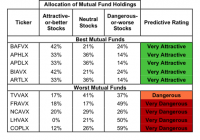Stocks Are Like Hamburgers: Be Bullish When Prices Go Down
Companies that buy back shares favor declines. So do bargain-hunters like Warren Buffett. Sellers should prefer price increases. The recent stock market decline was certainly disheartening for many investors, such as those needing to sell positions in order to fund retirement living expenses. Others, especially those building up a portfolio, or companies buying back shares, and with an eye out for the long term, reacted more gleefully. Why is it bad for some, and good for others, when the market goes south occasionally? Part of the answer can be gleaned from a 1997 letter written by Berkshire Hathaway ( BRK.A , BRK.B ) Chairman Warren Buffett: But now for the final exam: If you expect to be a net saver during the next five years, should you hope for a higher or lower stock market during that period? Many investors get this one wrong. Even though they are going to be net buyers of stocks for many years to come, they are elated when stock prices rise and depressed when they fall. In effect, they rejoice because prices have increased for the ‘hamburgers’ they will soon be buying. This reaction makes no sense. Only those who will be sellers of equities in the near future should be happy at seeing stocks rise. Prospective purchasers should much prefer sinking prices. Buffett roots for stocks to fall when he, or the company, is buying. The Oracle of Omaha owns a $12B chunk of International Business Machines (NYSE: IBM ), a company with a long history of buying back its own stock, which among other things makes the remaining shares more valuable. And occasionally he will add to his own holdings when he feels the time is right. Recently Berkshire increased its position in Phillips 66 (NYSE: PSX ). IBM is blue The Armonk, N.Y.-based IBM reduced its share count by 10% over the last two years, and by a fifth over the past half decade. However, by its own admission Big Blue is in a funk and has been unable to grow revenue and net income over the past few years. The company has been able to boost EPS only through the use of buybacks and other financial moves. The stock has dropped by 20% over the last two years. Management, led by CEO Virginia Rometty, is trying to right the ship and reinvent itself like it did after getting out of the PC business years ago. Today it is making bets in the fast growing cloud computing industry and with Big Data technology. IBM created a separate division for its Watson supercomputer and the Jeopardy! game show champion has found applications in the healthcare industry. In another potential lucrative move the company recently hooked-up with Apple, Inc. (NASDAQ: AAPL ) in a deal in which IBM will sell Apple products to its corporate clients. An investment in IBM could pay off for patient shareholders, like Buffett, willing to hold on for a long period of time. Indirectly, Berkshire investors can also expect a nice return. No oil shock here Not all of the players in the oil patch are in trouble. One niche, the refinery industry, has not been affected as much as the upstream and midstream segments of the business. And as the U.S. economy continues to improve demand for gasoline, diesel, and other refined fuels will probably increase and provide an opportunity for growth going forward. Phillips 66 is positioned well to benefit from the trends. Berkshire took advantage of a slight drop in Phillips 66 stock over the past year and increased its position to about $5B, including two purchases totaling about 3M shares over the past 10 days. After the recent, albeit small, pullback and with a price to book of 2.0, shares are reasonably priced at about 12x forward earnings estimates. A yield of 2.6% and payout ratio less than 30% might be attractive to investors needing a bit of extra income. Other financials, such as a debt to equity ratio of 39%, indicate that things are going well at Phillips. All things considered this might be a good entry point for any investor, not just Buffett. Conclusion Stocks are like hamburgers. Whether it is a company like International Business Machines wanting to reduce share count or an investor like Warren Buffett on the prowl for solid companies like Phillips 66 buying makes more sense at lower prices. Disclosure: I/we have no positions in any stocks mentioned, and no plans to initiate any positions within the next 72 hours. (More…) I wrote this article myself, and it expresses my own opinions. I am not receiving compensation for it (other than from Seeking Alpha). I have no business relationship with any company whose stock is mentioned in this article.
